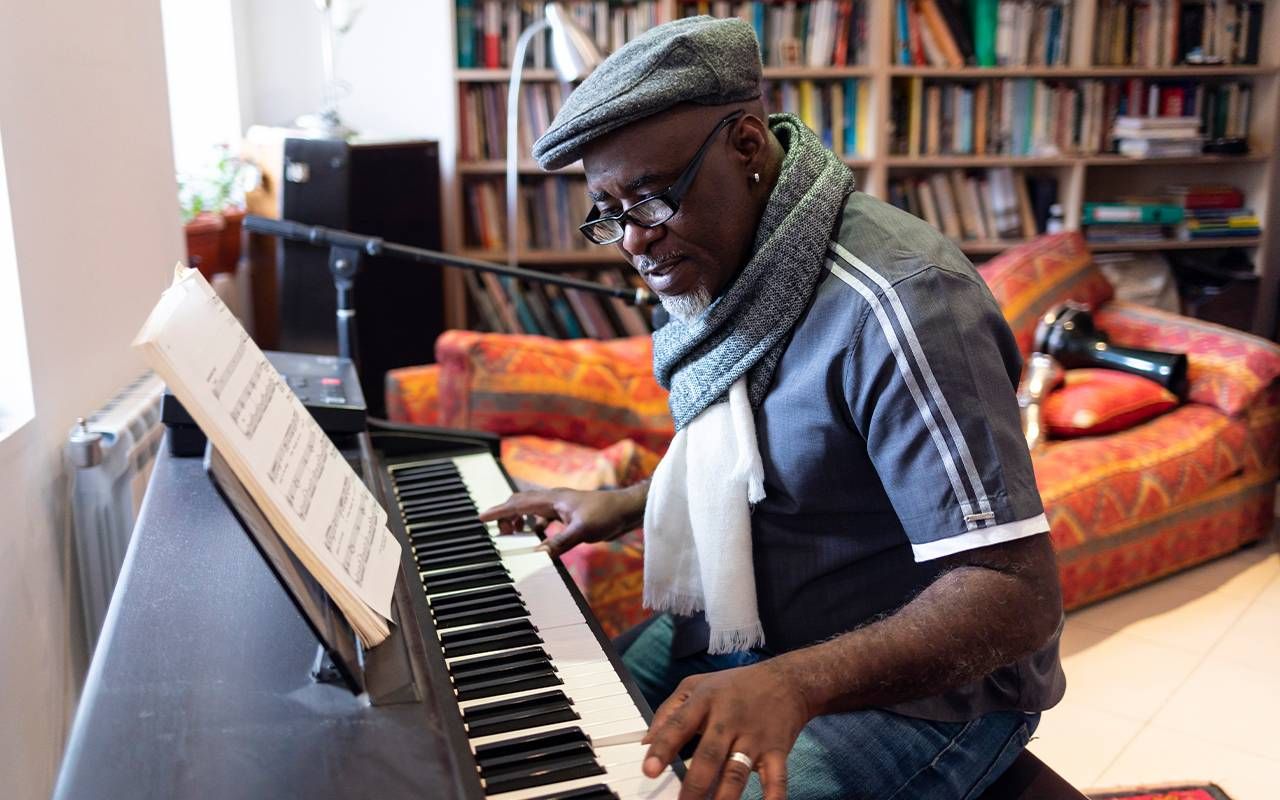On Music and Gray Matter
Study results are reassuring regarding brain health. It wouldn't hurt to say, 'Let's be more involved with music.'
As we age, our brains become less malleable, and some areas of the brain shrink in size and lose volume. Normal aging alters the brain and its performance, affecting the ability to remember names and words, limiting attention span and impacting the ability to perform everyday tasks.
Yet there are people who age better than others.

A healthy working memory boosts recall and the processing and manipulation of information.
While there have been studies demonstrating the benefits of education, physical exercise, diet and social stimulation on dementia and cognitive impairment, new research published in Neuroimage: Reports (June 2023) found that piano practice and music education can slow and even reverse the brain's atrophy in certain parts of the brain, mediating cognitive decline in healthy older adults.
Researchers discovered that six months of music intervention — learning to play the piano and participating in a music awareness program — increased the brain's gray matter volume and improved working memory performance for older adult participants. A healthy working memory boosts recall and the processing and manipulation of information.
Piano Playing vs. Analyzing Music
Scientists evaluated 132 healthy volunteers between 62 and 78 years who were randomly assigned to two groups of 66 each. One group learned to play the piano one hour a week, with regular daily practice sessions as part of homework. The others were taught to listen closely to musical patterns and learn music genre and style concepts.
The main thrust was that music could prevent the shrinking of certain brain parts and positively affect cognitive functions.
All the participants were "musically naïve" with less than six months of formal musical training. "We wanted people whose brains did not yet show any traces of plasticity linked to musical learning. Indeed, even a brief learning experience in the course of one's life can leave imprints on the brain, which would have biased our results," explained Damien Marie, first author of the study.
The results of the study were multi-faceted. The main thrust was that music could prevent the shrinking of certain brain parts and positively affect cognitive functions. Additionally, it was ascertained that the aging brain could adapt to music learning, that both groups — the ones learning the piano and the music culture group — had a similar increase in gray matter volume, and that sleep improved for participants during the learning process.
While the brain increased in volume, researchers also found that scores on working memory tests improved, regardless of whether the participants were learning to play the piano or closely listening to music.
Let's Be More Involved With Music
Dr. Sharon Sha, a clinical professor of neurology at Stanford, who is not associated with the study, said that the results show the trends are in the right direction. "It's great that music — something we haven't studied enough — can tap into cognitive functions," Sha said.
But she cautioned against drawing any causality from these results. You want a true placebo group compared to the treatment group in clinical trials or interventions.
In this study, intervention is performed on both groups — the group of pianists and the musical culture group — and there are improvements in both groups. Hence it's hard to extrapolate much, Sha said. Nevertheless, the study results are reassuring regarding brain health, and it wouldn't hurt to say, "Let's be more involved with music."
Neuroimaging and Testing to Examine the Brain's Functioning
All the participants were given a battery of psychometric tests, such as repeating a series of digits of increasing length and in reverse order, naming objects, finding similarities, solving visual puzzles, searching for a target symbol in a row of symbols and the ordering of sound patterns to assess verbal and auditory working memory.
Overall, for both groups, there was an improvement in both auditory and verbal tasks throughout the trial. The researchers concluded that the intensity of the weekly classes, the daily homework regimen, the quality of sleep and the increase in gray matter volume influenced this gain in performance.
"Neuroimaging revealed an increase in gray matter in four brain regions involved in high-level cognitive functioning in all participants, including cerebellum areas involved in working memory. Their performance increased by 6% and this result was directly correlated to the plasticity of the cerebellum,'' Clara James, an author of the study, was quoted as saying in a press release on the study
What Does Brain Plasticity Mean?
Plasticity refers to "how the brain basically gets wired with experience," said Margarita Kaushanskaya, a researcher at the University of Wisconsin-Madison. In other words, the brain adapts to experiences.
"So it's not structural in the sense that no new brain areas or brain cells are grown, but new connections," she said. And this adaptation is a lot more robust when the brain is younger, "so typically we think of plasticity in association with a young brain."
"This study [showing] aging brains are plastic is terrific, and it goes along with cognitive stimulation and wellness," remarked Sha.
Healthy, Old Dogs Learning New Tricks
The brain's plasticity works with "cognitive reserve," a reservoir of life experience skills deployed to protect against cognitive decline and when faced with challenges.
"If you're already cognitively healthy maybe you can put more in that brain bank, so to speak, before you tap out."
The term was first used in 1988 when, upon autopsy, it was discovered that 137 individuals at a nursing facility had brain changes that indicated the prevalence of Alzheimer's yet displayed no symptoms. Research showed that a sizeable cognitive reserve was responsible for this phenomenon.
We are talking about brain resilience, according to Jet Vonk, an assistant professor in the Department of Neurology at the University of California, San Francisco. Leisure activities, healthy lifestyle, good sleep habits, learning a second language, being good at math, doing Sudoku every day, music instruction, all build cognitive reserve, "and I don't think there's any data to suggest that doing it earlier in life is somehow more beneficial than doing it later in life," Vonk said.
In this study, it was assumed that the participants' learning experience contributed to cognitive reserve. "If you're already cognitively healthy maybe you can put more in that brain bank, so to speak, before you tap out," Sha said, using the adage of an old dog learning new tricks.
Can Music Rejuvenate the Brain?
Damien Marie carefully emphasized that "we cannot conclude that musical interventions rejuvenate the brain. They only prevent aging in specific regions." The interconnections between music, gray matter, memory and sleep are too complicated.
First, it's not clear what the increase in gray matter volume consists of. "There's synaptic density, there's connections, there could be fluid, so it's hard to know what is going into that volume," said Sha.
Even if it's unclear exactly what music does to the brain, what is important about this study is that it unpeels some of the layers of how music may be connected to improvements in our memory mechanism and helps prevent certain regions of the brain from atrophying.
Perhaps the most compelling idea to emerge from this study is to persuade a more intentional inclusion of music in our lives, no matter how old we are.


